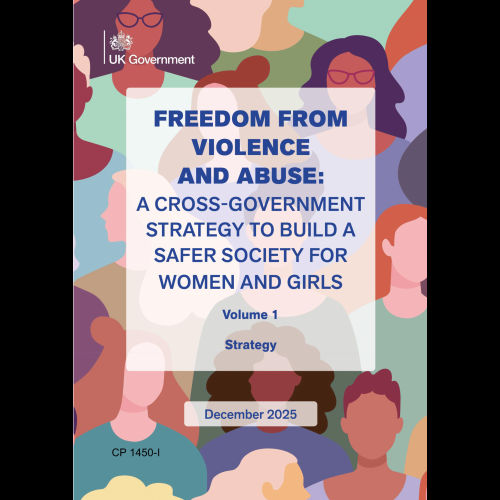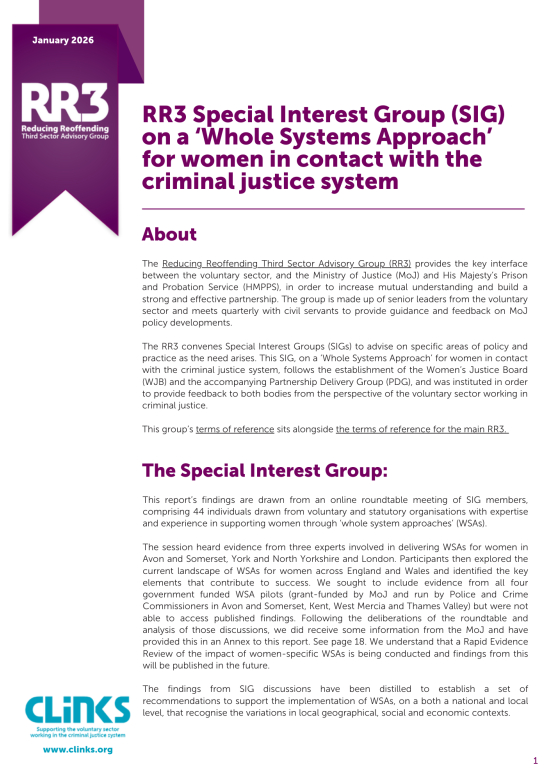In a previous blog we provided details about the government’s coronavirus End of Custody Temporary Release (ECTR) scheme. In that post we made it clear that although prisoners released under ECTR are still serving a prison sentence and, consequently, are not subject to probation supervision, they are still eligible for Through The Gate (TTG) services from 12 weeks before their earliest release date – in other words, every individual released in this way will be eligible for TTG support.
This blog post gives details from the official guidance on what this TTG service should consist of for this cohort of prisoners and forms a key element in Her Majesty's Prison and Probation Service’s (HMPPS) “exceptional delivery plan” to deal with the challenges of the pandemic.
Clinks is grateful to HMPPS for providing us with a direct line of communication to ensure that we can give all voluntary organisations working in the criminal justice system the latest and most accurate information about how our prison and probation services are adapting to COVID-19 and the implications for service delivery.
Accommodation
HMPPS has invested considerable time and resources in trying to ensure that prisoners released early because of coronavirus have decent accommodation to go to; additional budgets have been made available to ensure that no individual is released homeless. TTG providers are expected to source accommodation for this group of early releases. The official guidance recommends that anyone who has to be placed in temporary accommodation should also be given any wraparound support that they require.
Every area has set up a “Homelessness Accommodation Bronze Group” which will act as the operational implementation route to ensure that everyone released temporarily because of COVID-19 contingencies has suitable accommodation agreed pre-release. These groups include representation from the National Probation Service (NPS), Community Rehabilitation Companies (CRCs) and Through the Gate providers. There should also be clear links into wider local partners such as local authorities, police and health.
Individuals who are released early and who are medically vulnerable (such as pregnant women or mothers and babies) will have a condition in their Release on Temporary Licence (ROTL) to stay in touch with their responsible officer in the NPS or CRC for the duration of their release even though there is no mandatory supervision requirement.
Support while on temporary release
TTG teams are required to ensure that each released prisoner has a TTG nominated person’s contact number. There is an expectation that within the first 48 hours of release the designated member of the TTG team should contact the ROTL’d individual by telephone, to offer support and to assist in the usual resettlement planning activity in preparation for their formal release date. The official guidance makes it clear that there is no requirement for the ROTL’d prisoner to make contact or comply with these calls which are for support, guidance and resettlement planning.
The member of staff who makes the contact is expected to record the contact within OAsys and should update the Community Responsible Officer (NPS or CRC) who will manage the case at the expiry of the period of ROTL, once mandatory supervision comes into effect.
Financial support
All prisoners released on ECTR will receive a grant of £80 and a travel warrant. Additionally, a discretionary accommodation payment up to £50 is available for some individuals.
Once released, individuals are expected to apply for benefit, such as Universal Credit. It is expected that while their claim is processed, they should have access to advance payments to bridge the gap between release and the first benefit payment. TTG workers are expected to be fulfil a critical role in helping individuals ensure that they have a bank account which is key to accessing Universal Credit. Challenger bank accounts are available for those with smartphones and are easier to access than a high street bank. Clinks has received helpful reports from some members delivering TTG services that they have been able to develop such good working relationships with local Job Centres that they have not needed to access the national DWP Universal Credit helpline which is under unprecedented strain.
Communication
CRCs have been instructed to purchase mobile phones for prison leavers – distribution of these will take place on a prison by prison basis depending on specific circumstances. Where there is the facility for TTG staff to meet safely with prisoners discharged on ROTL, the official guidance asks them to consider distributing the phones at that point, using Visitors Centres, Departure Lounges etc. Where this is not possible, TTG teams should make arrangements with individual prisons for the distribution of the phones by prison staff.
The guidance emphasises that it is essential that the telephone number of the discharged prisoner is made available to the TTG team and that the prisoner is given a number to contact the TTG team.
Pre-release work
The HMPPS guidance acknowledges that pre-release work will need to adapt to prison coronavirus protection measures and provides different requirements for three categories of prisons: prisons where access to prisoners is still possible; prisons to which TTG workers have access but where no access to prisoners as possible; and prisons which TTG workers are not able to access. These requirements are summarised in the table below:
Summary
Clinks will continue to keep you up-to-date with any changes to the Through the Gate delivery model. We would welcome feedback from members on the successes and challenges of this emergency model of delivering. Please remember that you can read full details of the End of Custody Temporary Release (ECTR) scheme in our previous blog post here.
What's new
Blogs
Violence Against Women and Girls (VAWG) Strategy Blog
Publications
RR3 Special Interest Group (SIG) on a ‘Whole Systems Approach’ for women in contact with the criminal justice system
The RR3 SIG drives a Whole Systems Ap
Latest on X
The role is for a leader from an organisation focused on racially minoritised people, with expertise in service delivery, policy, advocacy, or related areas in criminal justice. Racial disparities are present at every CJS stage. This role ensures these voices are central in shaping policy to help address and eradicate them. Apply by Mon 18 Nov, 10am. More info: https://www.clinks.org/voluntary-community-sector/vacancies/15566 #CriminalJustice #RR3 #RacialEquity

